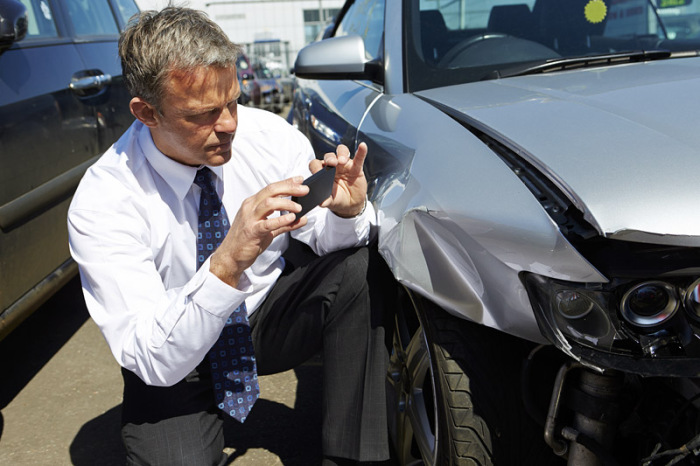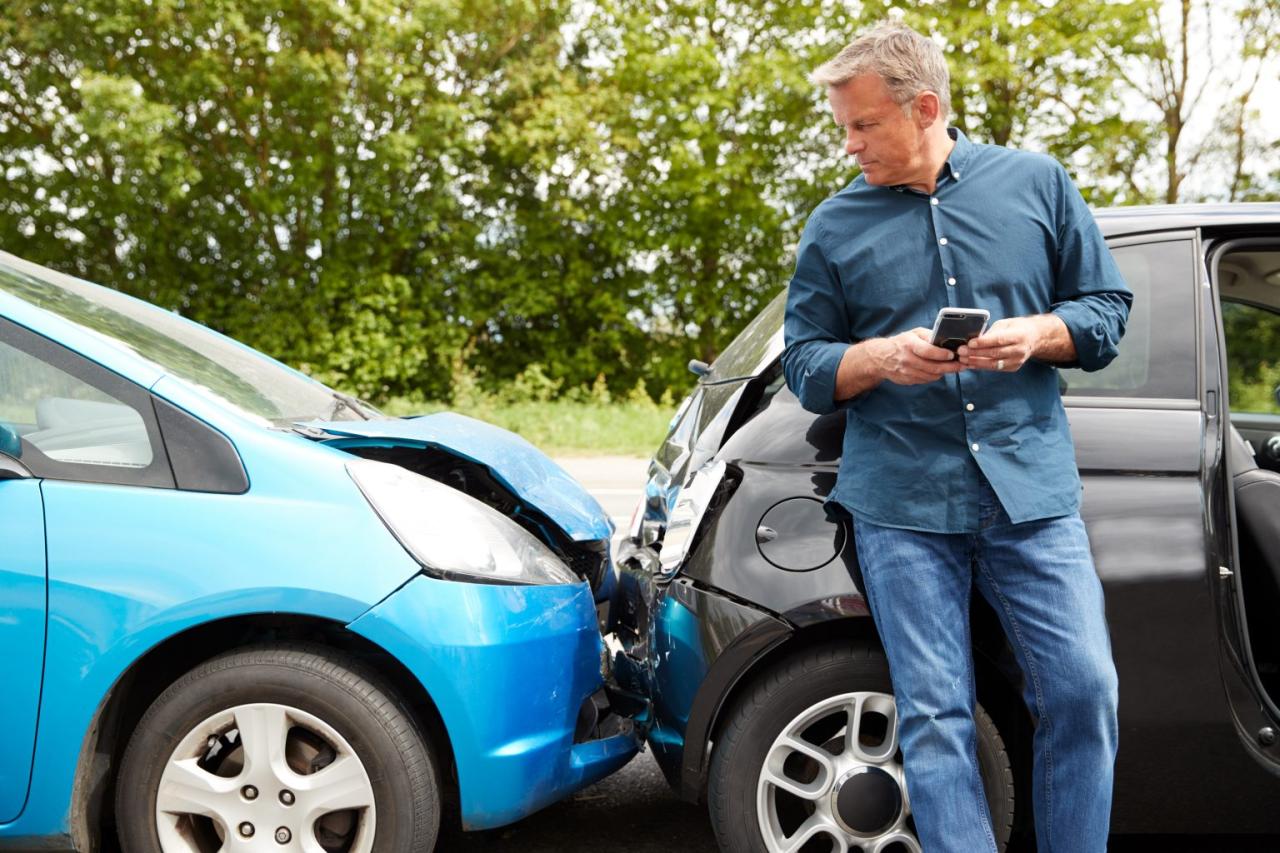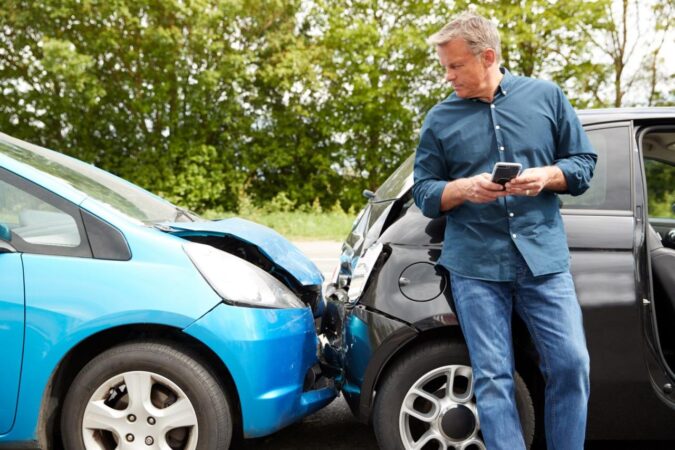
Types of Automobile Accidents
Automobile accidents can occur in various forms, each with unique characteristics and consequences. Understanding the different types of accidents can help drivers recognize potential hazards and take appropriate precautions.
According to the National Highway Traffic Safety Administration (NHTSA), the most common types of automobile accidents include:
Head-on Collisions
Head-on collisions occur when the front ends of two vehicles collide directly. These accidents are often severe and can result in serious injuries or fatalities due to the high impact forces involved.
- Approximately 10% of all fatal crashes are head-on collisions.
- Speeding, distracted driving, and driving under the influence of alcohol or drugs are common contributing factors.
Causes of Automobile Accidents

Automobile accidents are a leading cause of injuries and fatalities worldwide. Understanding the primary causes of these accidents is crucial for developing effective prevention strategies.
Distracted Driving
Distracted driving, such as using a cell phone, texting, or engaging in other activities that divert attention from the road, is a major contributor to automobile accidents. Distracted drivers may fail to notice hazards, react to changing conditions, or maintain proper control of their vehicles, leading to collisions.
Speeding
Excessive speed is another significant factor in automobile accidents. Speeding reduces the driver’s reaction time and increases the severity of impacts. Vehicles traveling at high speeds have a longer stopping distance, making it more difficult to avoid obstacles or other vehicles.
Driving Under the Influence
Driving under the influence of alcohol or drugs impairs judgment, coordination, and reaction time. Intoxicated drivers are more likely to make errors, such as failing to yield, running red lights, or driving in the wrong lane.
Mechanical Failures
While mechanical failures are less common causes of automobile accidents, they can still pose significant risks. Faulty brakes, steering systems, or tires can cause vehicles to malfunction, leading to loss of control or collisions. Regular vehicle maintenance and inspections are essential for preventing mechanical failures.
Legal Aspects of Automobile Accidents

The aftermath of an automobile accident can be a stressful and confusing time. Understanding the legal process involved can help you navigate this challenging situation.
Filing a Claim
After an accident, it’s crucial to file a claim with the insurance company of the at-fault driver. This process involves providing documentation such as the police report, medical records, and proof of damages. The insurance company will investigate the claim and determine the amount of compensation you are entitled to.
Negotiating Settlements
If the insurance company accepts liability for the accident, they will typically offer a settlement to compensate you for your injuries and damages. It’s important to carefully consider the settlement offer and consult with an attorney if necessary. Negotiating a fair settlement can help you obtain the compensation you deserve.
Going to Trial
In some cases, it may be necessary to go to trial to resolve an automobile accident claim. This process involves presenting evidence to a judge or jury who will determine the liability of the parties and the amount of damages awarded. Going to trial can be a lengthy and expensive process, but it may be the best option if you are unable to reach a fair settlement with the insurance company.
Statute of Limitations
It’s important to be aware of the statute of limitations for filing an automobile accident claim. This varies from state to state, but generally ranges from one to six years. Failing to file a claim within the statute of limitations can bar you from seeking compensation.
Other Legal Deadlines
In addition to the statute of limitations, there are other legal deadlines that may apply to automobile accident cases. For example, you may be required to provide the insurance company with a notice of your claim within a certain time frame. Failing to meet these deadlines can impact your ability to recover compensation.
Consulting with an experienced automobile accident attorney can help you understand the legal process and protect your rights.
Role of an Automobile Accidents Lawyer
An automobile accidents lawyer is a legal professional who specializes in representing victims of car accidents. They play a crucial role in helping individuals navigate the complex legal landscape and maximize their compensation.
Insurance Claims
After an accident, insurance companies often try to minimize their payouts. An experienced lawyer can assist with filing insurance claims, negotiating with adjusters, and ensuring you receive fair compensation for your injuries, property damage, and other expenses.
Negotiations
If insurance negotiations fail, your lawyer can initiate settlement discussions with the at-fault party or their insurance company. They will aggressively advocate for your rights and negotiate a fair settlement that covers your damages.
Litigation
In some cases, litigation may be necessary to obtain the compensation you deserve. An automobile accidents lawyer can file a lawsuit, present evidence in court, and fight for your rights at trial.
Benefits of Hiring an Automobile Accidents Lawyer
Hiring an experienced and qualified automobile accidents lawyer offers several benefits:
- Expertise and Experience: Lawyers specialize in handling car accident cases, providing you with expert guidance and representation.
- Negotiation Skills: Lawyers are skilled negotiators who can maximize your compensation through negotiations.
- Legal Protection: Lawyers ensure your legal rights are protected and represent you effectively in court.
- Reduced Stress: Dealing with the aftermath of an accident can be overwhelming. A lawyer can handle the legal aspects, allowing you to focus on recovery.
If you have been involved in an automobile accident, consider consulting with an experienced automobile accidents lawyer to discuss your rights and options.
Selecting an Automobile Accidents Lawyer
Choosing the right automobile accidents lawyer is crucial to maximize your chances of a successful outcome. Consider the following factors:
Experience and Expertise
Seek an attorney with a proven track record in handling automobile accident cases. Check their experience in negotiating settlements, litigating cases, and obtaining favorable outcomes for clients.
Reputation and Referrals
Research the lawyer’s reputation within the legal community and among past clients. Positive reviews and referrals indicate a strong reputation and a history of satisfied clients.
Communication and Availability
Choose an attorney who communicates effectively, keeps you informed about your case, and is easily accessible. You need an attorney who is responsive and understands your concerns.
Fees and Costs
Discuss the attorney’s fees and costs upfront. Some lawyers work on a contingency basis, while others charge an hourly rate. Make sure you understand the payment structure and any potential additional expenses.
Tips for Finding and Interviewing Lawyers
- Ask for recommendations from friends, family, or other professionals.
- Attend legal aid clinics or consult with bar associations for referrals.
- Conduct online research and read client reviews.
- Interview multiple attorneys to compare their experience, expertise, and communication style.
- Bring relevant documents, such as police reports and medical records, to the interview.
Compensation for Automobile Accidents
Victims of automobile accidents may be entitled to various forms of compensation to cover their losses and expenses resulting from the accident. Damages are typically awarded to compensate victims for their injuries, financial losses, and other hardships caused by the accident.
The amount of compensation awarded in an automobile accident case depends on several factors, including the severity of the injuries, the extent of the financial losses, and the degree of fault attributed to the parties involved.
Medical Expenses
Medical expenses are a major component of damages awarded in automobile accident cases. These expenses can include the costs of emergency medical care, hospitalization, surgery, rehabilitation, and ongoing medical treatment.
Lost Wages
Victims who are unable to work due to their injuries may be entitled to compensation for lost wages. This compensation can include both past and future lost earnings, as well as benefits such as sick leave and vacation time.
Pain and Suffering
Pain and suffering damages are awarded to compensate victims for the physical and emotional pain and suffering they have endured as a result of the accident. These damages are often difficult to quantify, but they can be a significant component of the overall compensation awarded.
Property Damage
Victims who have suffered property damage as a result of the accident may be entitled to compensation for the cost of repairing or replacing their vehicle, as well as other personal property that was damaged or destroyed.
Insurance Coverage for Automobile Accidents

Automobile insurance coverage is crucial in protecting drivers from financial losses resulting from accidents. It provides compensation for damages, injuries, and legal expenses. Understanding the different types of insurance policies and how they work can significantly impact the outcome of accident claims.
Liability Coverage
Liability coverage is mandatory in most jurisdictions. It covers damages caused to others, including bodily injuries, property damage, and legal expenses. Liability insurance protects the policyholder from financial liability if they are found at fault for an accident.
Collision Coverage
Collision coverage protects the policyholder’s own vehicle from damages caused by a collision with another vehicle or object. It is not mandatory but highly recommended, especially if the vehicle is financed or leased.
Uninsured/Underinsured Motorist Coverage
Uninsured/underinsured motorist coverage protects the policyholder from financial losses caused by accidents with drivers who are uninsured or underinsured. It provides compensation for bodily injuries and property damage up to the policy limits.
Understanding the details of these insurance policies, including deductibles, limits, and exclusions, is essential for informed decision-making. Consulting with an insurance professional can help individuals tailor their coverage to meet their specific needs and ensure adequate protection in the event of an accident.
Avoiding Automobile Accidents
To enhance your safety on the road, it’s crucial to adopt proactive measures and cultivate defensive driving habits. By understanding the common causes of automobile accidents and implementing preventive strategies, you can significantly reduce your risk of being involved in a collision.
Vehicle maintenance plays a pivotal role in accident prevention. Regular inspections, timely repairs, and adherence to manufacturer-recommended maintenance schedules ensure your vehicle is in optimal condition. This includes checking tire pressure, fluid levels, and brake function regularly.
Defensive Driving Techniques
Defensive driving involves anticipating potential hazards and taking appropriate actions to avoid them. Key techniques include:
- Maintaining a safe following distance to provide ample reaction time.
- Scanning the road ahead for potential obstacles or hazards.
- Avoiding distractions such as cell phone use or texting while driving.
- Being aware of blind spots and checking mirrors frequently.
- Anticipating the actions of other drivers and pedestrians.
Vehicle Maintenance
- Regular inspections and maintenance can identify and address potential mechanical issues that could contribute to accidents.
- Proper tire maintenance, including regular inflation checks and rotation, ensures optimal traction and handling.
- Adequate brake function is essential for stopping safely and avoiding rear-end collisions.
- Headlight and taillight maintenance ensures visibility in low-light conditions.
Other Proactive Measures
In addition to defensive driving and vehicle maintenance, other proactive measures can further reduce your risk of an accident:
- Avoid driving while fatigued or under the influence of alcohol or drugs.
- Be aware of weather conditions and adjust driving habits accordingly.
- Plan your route in advance and familiarize yourself with unfamiliar roads.
- Consider using driver assistance technologies such as lane departure warnings and automatic emergency braking.





